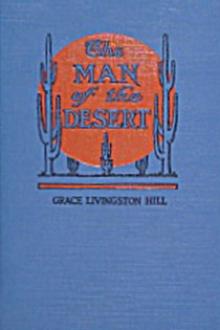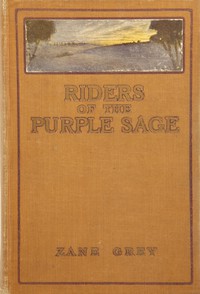The Desert of Wheat, Zane Grey [good non fiction books to read .TXT] 📗

- Author: Zane Grey
Book online «The Desert of Wheat, Zane Grey [good non fiction books to read .TXT] 📗». Author Zane Grey
Anderson's voice went to a whisper, and he looked pityingly at Lenore.
"That hospital was a barn. No doctors! Too early.… The nurses weren't in sight. I met one later, an', poor girl! she looked ready to drop herself!… We found Jim in one of the little rooms. No heat! It was winter there.… Only a bed!… Jim lay on the floor, dead! He'd fallen or pitched off the bed. He had on only his underclothes that he had on—when he—left home.… He was stiff—an' must have—been dead—a good while."
Lenore held out her trembling hands. "Dead—Jim dead—like that!" she faltered.
"Yes. He got pneumonia," replied Anderson, hoarsely. "The camp was full of it."
"But—my God! Were not the—the poor boys taken care of?" implored Lenore, faintly.
"It's a terrible time. All was done that could be done!"
"Then—it was all—for nothing?"
"All! All! Our boy an' many like him—the best blood of our country—Western blood—dead because … because …"
Anderson's voice failed him.
"Oh, Jim! Oh, my brother!… Dead like a poor neglected dog! Jim—who enlisted to fight—for—"
Lenore broke down then and hurried away to her room.
With great difficulty Mrs. Anderson was revived, and it became manifest that the prop upon which she had leaned had been slipped from under her. The spirit which had made her strong to endure the death of her boy failed when the sordid bald truth of a miserable and horrible waste of life gave the lie to the splendid fighting chance Jim had dreamed of.
When Anderson realized that she was fading daily he exhausted himself in long expositions of the illness and injury and death common to armies in the making. More deaths came from these causes than from war. It was the elision of the weaker element—the survival of the fittest; and some, indeed very many, mothers must lose their sons that way. The government was sound at the core, he claimed; and his own rage was at the few incompetents and profiteers. These must be weeded out—a process that was going on. The gigantic task of a government to draft and prepare a great army and navy was something beyond the grasp of ordinary minds. Anderson talked about what he had seen and heard, proving the wonderful stride already made. But all that he said now made no impression upon Mrs. Anderson. She had made her supreme sacrifice for a certain end, and that was as much the boy's fiery ambition to fight as it was her duty, common with other mothers, to furnish a man at the front. What a hopeless, awful sacrifice! She sank under it.
Those were trying days for Lenore, just succeeding her father's return; and she had little time to think of herself. When the mail came, day after day, without a letter from Dorn, she felt the pang in her breast grow heavier. Intimations crowded upon her of impending troubles that would make the present ones seem light.
It was not long until the mother was laid to rest beside the son.
When that day ended, Lenore and her father faced each other in her room, where he had always been wont to come for sympathy. They gazed at each other, with hard, dry eyes. Stark-naked truth—grim reality—the nature of this catastrophe—the consciousness of war—dawned for each in the look of the other. Brutal shock and then this second exceeding bitter woe awakened their minds to the futility of individual life.
"Lenore—it's over!" he said, huskily, as he sank into a chair. "Like a nightmare!… What have I got to live for?"
"You have us girls," replied Lenore. "And if you did not have us there would be many others for you to live for.… Dad, can't you see—now?"
"I reckon. But I'm growin' old an' mebbe I've quit."
"No, dad, you'll never quit. Suppose all we Americans quit. That'd mean a German victory. Never! Never! Never!"
"By God! you're right!" he ejaculated, with the trembling strain of his face suddenly fixing. Blood and life shot into his eyes. He got up heavily and began to stride to and fro before her. "You see clearer than me. You always did, Lenore."
"I'm beginning to see, but I can't tell you," replied Lenore, closing her eyes. Indeed, there seemed a colossal vision before her, veiled and strange. "Whatever happens, we cannot break. It's because of the war. We have our tasks—greater now than ever we believe could be thrust upon us. Yours to show men what you are made of! To raise wheat as never before in your life! Mine to show my sisters and my friends—all the women—what their duty is. We must sacrifice, work, prepare, and fight for the future."
"I reckon," he nodded solemnly. "Loss of mother an' Jim changes this damned war. Whatever's in my power to do must go on. So some one can take it up when I—"
"That's the great conception, dad," added Lenore, earnestly. "We are tragically awakened. We've been surprised—terribly struck in the dark. Something monstrous and horrible!… I can feel the menace in it for all—over every family in this broad land."
"Lenore, you said once that Jim—Now, how'd you know it was all over for him?"
"A woman's heart, dad. When I said good-by to Jim I knew it was good-by forever."
"Did you feel that way about Kurt Dorn?"
"No. He will come back to me. I dream it. It's in my spirit—my instinct of life, my flesh-and-blood life of the future—it's in my belief in God. Kurt Dorn's ordeal will be worse than death for him. But I believe as I pray—that he will come home alive."
"Then, after all, you do hope," said her father. "Lenore, when I was down East, I seen what women were doin'. The bad women are good an' the good women are great. I think





Comments (0)